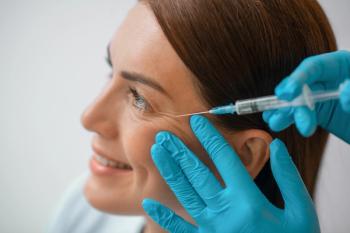
Saving face
International report - The world's first full-face transplant could happen in 2007, sources say, even though they say there's no race to perform the groundbreaking surgery.
A British team has now won ethical approval for the procedure, joining two United States programs that already have received institutional approval. A team in Cleveland continues to evaluate potential recipients, and a team in Louisville, Ky., continues to probe ethical and psychological issues.
In October, a team of British surgeons led by Peter Butler, M.D., of London's Royal Free Hospital won local ethical approval to perform a series of full-face transplants that could begin as early as 2007, published accounts say.
Since about 2003, a total of 34 people have approached Dr. Butler's team, which continues to seek more potential patients, Neil Huband, a Royal Free Hospital spokesman, tells Dermatology Times.
'One of many steps'
However, "IRB approval does not necessarily mean a face transplant procedure will be done - it is just one of many steps" in the process, says John H. Barker, M.D., Ph.D., who recommends examining the infrastructure Dr. Butler has assembled for a better indication of its readiness.
Dr. Barker is director of plastic surgery research at the University of Louisville, Ky., and coordinator of its face transplant team, which has earned ethical approval from its sister institution the University of Utrecht, Netherlands, and continues working on ethical and psychological issues.
"Dr. Butler's team is 31 strong, with about half of that number being surgeons and the rest anesthetists and psychologists," Mr. Huband says. He also confirms the following details reported in a recent China Daily article:
At press time, Dr. Butler's project appeared to have hit a roadblock in the form of opposition from England's Royal College of Surgeons (RCS), which is responsible for training surgeons. An Oct. 25, 2006, RCS press release says that in light of its "grave concerns about face transplantation," the hospital should first meet RCS' minimal requirements for this procedure, which were scheduled for publication in mid-November.
Mr. Huband replies that the RCS lacks authority to block the procedure. However, he adds, Dr. Butler supports strict regulation of face-transplant teams and has been asking the RCS to recommend requirements for years.
More transplants
Meanwhile, the team that performed the world's first partial face transplant has earned approval from French regulators to pursue five more face transplants in the coming years, reports Benoit Lengele, M.D., co-leader of the team with Jean-Michel Dubernard, M.D., and Bernard Devauchelle, M.D.
"We have several patients under very cautious evaluation for an eventual face grafting procedure," though, at press time, none had been wait-listed, says Dr. Lengele, also professor of anatomy and reconstructive microsurgery at Catholic University of Louvain, Brussels, Belgium.
"We don't want to race" to perform the next transplant, he says.
Whether the procedure occurs in 2007 depends on whether team members agree on any patient or patients' suitability, and on donor availability, he says.
Newsletter
Like what you’re reading? Subscribe to Dermatology Times for weekly updates on therapies, innovations, and real-world practice tips.











